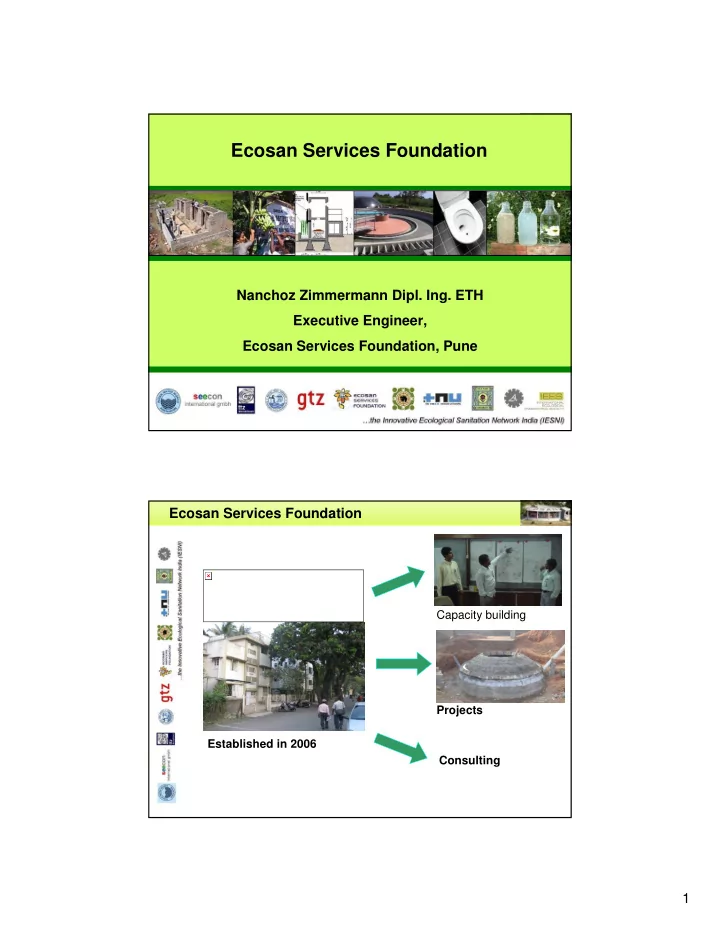

Ecosan Services Foundation Nanchoz Zimmermann Dipl. Ing. ETH Executive Engineer, Ecosan Services Foundation, Pune Ecosan Services Foundation Capacity building Projects Established in 2006 Consulting 1
IESNI Members of the Innovative Ecological Sanitation Network India (IESNI): Indian Water Works Seecon international, Ecosan Services Technologie- Association, India Switzerland Foundation, India Transfer Zentrum and der Hochschule Bremerhaven, Germany The Network German Technical Maharashtra Jeevan University, Pradhikaran, India Cooperation, Germany Netherlands International Ecological Navsarjan Trust, Kalyani ACTS, India Engineering Society, India University, India Switzerland Source: GTZ IESNI – a virtual network I nnovative E cological S anitation N etwork I ndia (IESNI) Objektives: Logos der Partner Supporting the development of: • innovative ecological sanitation systems (closed loop systems) for India (for rural and urban applications) • the institutional and economical framework for implementation of innovative ecological sanitation systems in India • the acceptance of reusing recycled nutrients in agricultural applications Implementing and evaluating pilot projects in India. Providing capacity building, knowledge dissemination, experience sharing and implementation support 2
Role of ESF into the IESNI IESNI Training courses Feasibilty studies Pilot Projects Comercial projects CO-Organisation of National Workshop on Sustainable Sanitation Objective of the Ecosan Course Many successful ecosan projects raised awareness and acceptance for innovative ecological sanitation solutions worldwide. But: Significant lack of qualified local personnel to implement projects at the grassroots level. Two-week participatory and interdisciplinary ecosan training course, which enables local participants to plan, implement and maintain their own ecosan projects. Source: GTZ 3
Ecosan Services Foundation ESF training courses 1. week basics excursions / site visits source: gtz lectures 2. week technolgies case studies Teaching Methods Lectures International team of ecosan experts from India, Thailand, Switzerland, Germany and Austria. Source: GTZ 4
Teaching Methods Group Works Interactive group works from assessing drawbacks of conventional sanitation systems to the designing and planning of real ecosan projects. Source: GTZ Teaching Methods Role Plays By playing different roles, participants get an insight into the requirements of different stakeholder groups to a sustainable sanitation system. Source: GTZ 5
Teaching Methods Case Studies Case studies give the participants insight into working ecosan projects. Source: GTZ Teaching Methods Field Trip to Ecosan Projects By visiting ecosan projects in a two-day field trip, participants see working ecological sanitations systems in practice, which is very important for their thorough understanding of the concept. Source: GTZ 6
Teaching Methods Field Trip to Ecosan Projects Source: GTZ Teaching Methods Own Ecosan Case Study Development In the second week of the course, participants develop an outline of an real ecosan project including the project background, decision making process, a holistic reuse concept and technical alternatives. Source: GTZ 7
Used Material Promotion Flyers Course Folder for every participant Ecosan Curriculum 2.0 CD Source: GTZ Used Material Ecosan Models Learning Material: Capacity Building for Ecological Sanitation Source: GTZ 8
Ecosan Course Certification: On completion of the course ,the participants get; • A course certificate from the International Ecological Engineering Society (IEES), Switzerland and the Innovative Ecological Sanitation Network India (IESNI) • Ecosan Expert Card Course Statistics • So far, 5 courses have been held, 3 2-weeks courses and 2 one-week courses. � More than 60 participants have been trained. • 5 projects planned/implemented by former course participants • Participants come from - NGOs - Government agencies - Universities - Private companies • Course participants from various Indian states, Bangladesh, Philippines and China • Course structure contributes to establishing a good network for sustainable sanitation 9
Feedback from Students “The interactive approach is an unusual teaching method in India. We enjoyed it and learned a lot. Not only about ecosan, but also how to express thoughts in public and how to interact as a group.” Kavitha Babu, COSTFORD, Kerala “We learned a holistic approach to sanitation and project management.” “The knowledge we gained will help Ashish Deshpande, us to implement sustainable MJP Maharashtra sanitation projects. Now I have a broader approach, not only on technologies, but also on other aspects of sanitation, environmental, social, reuse, hygiene and health.” Deepak Kulkarni, MJP Maharashtra Source: GTZ ESF got Water Unesco Award – Water Education 10
Ecosan Services Foundation Thank you for your attention! Nanchoz Zimmermann, ESF Pune 11
Recommend
More recommend